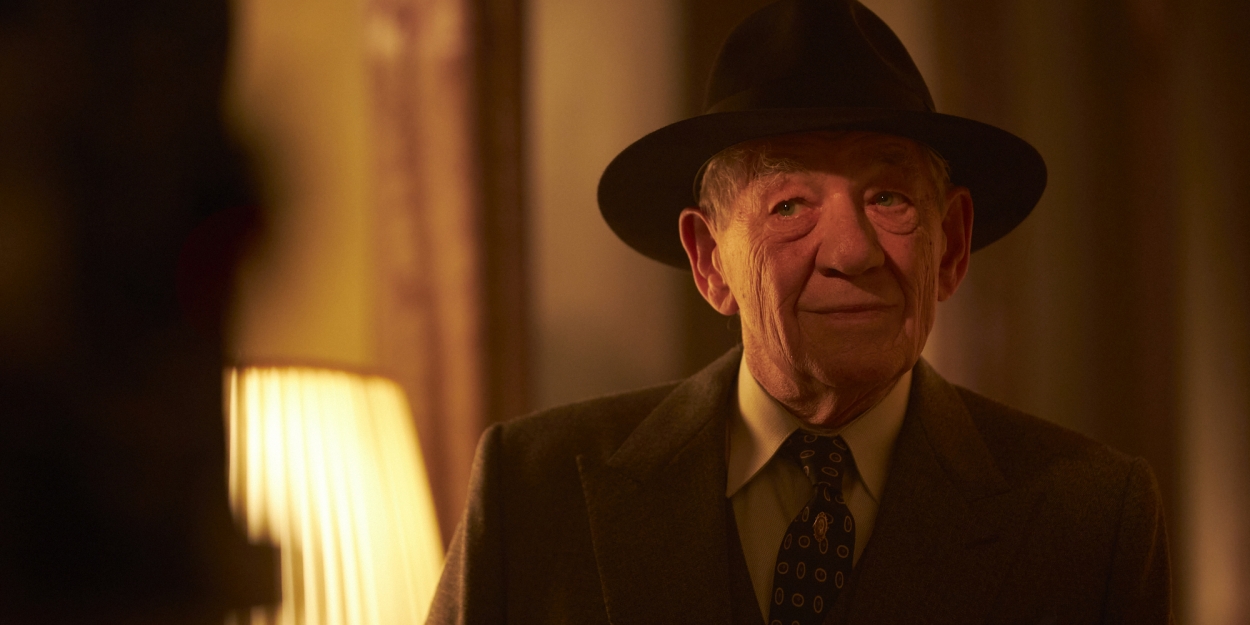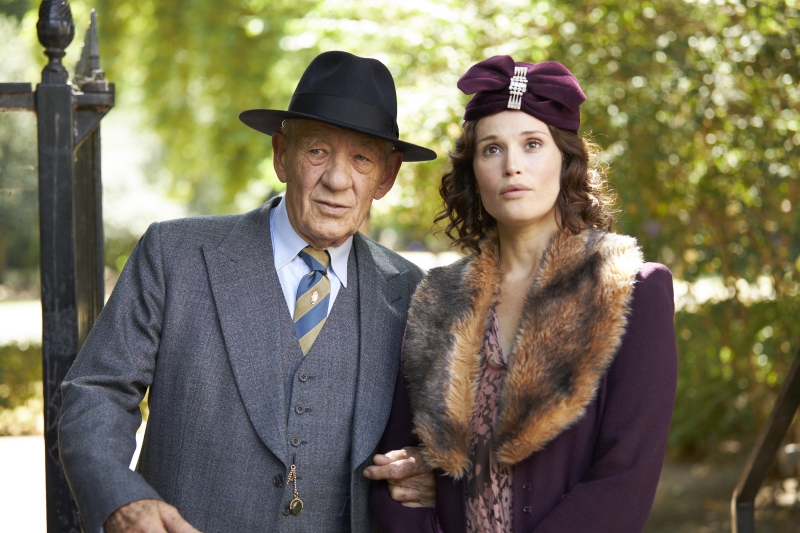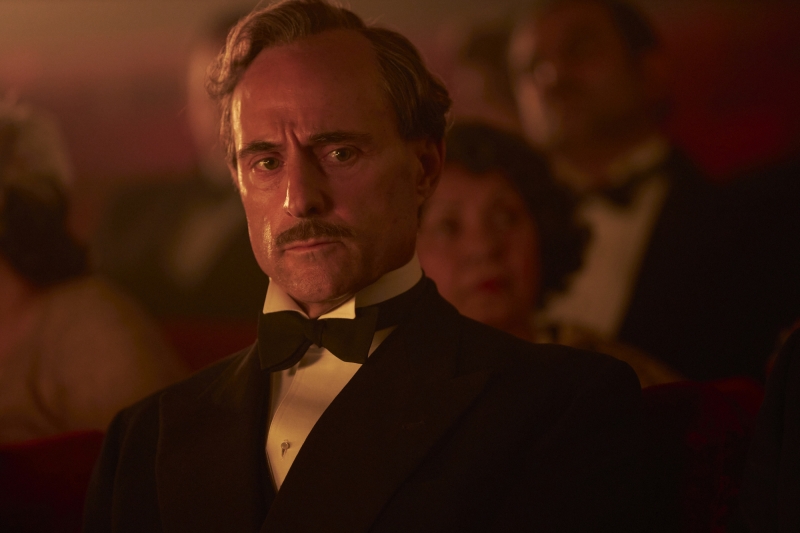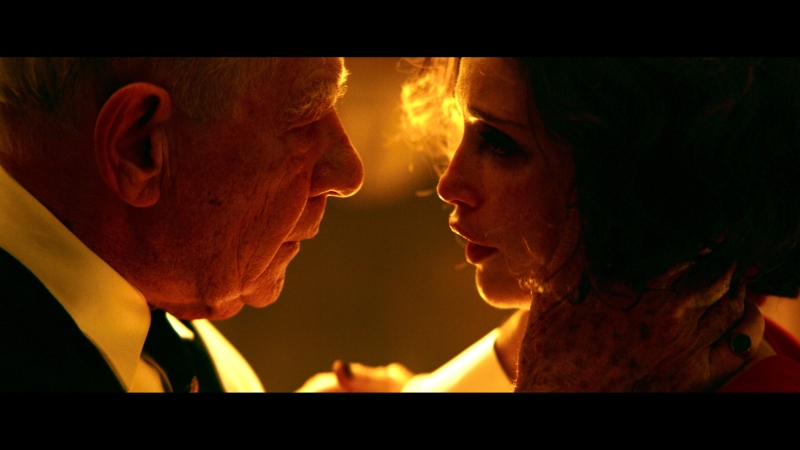Interview: 'Critics and Actors Don't Officially Get On': Actor Sir Ian McKellen on New Film THE CRITIC
The Critic is in cinemas nationwide from 13 September

The Critic, a film written by Patrick Marber and directed by Anand Tucker, comes to cinemas in the UK on September 13. Audiences are introduced to a formidable gay theatre critic of the 1930s, Jimmy Erskine (Ian McKellen) and watch as he corrupts a young actress, Nina Land (Gemma Arterton), leading to danger and blackmail.
BroadwayWorld sat down with Sir Ian McKellen about taking on the role of Jimmy Erskine, in The Critic. We discussed period drama, how performing for movies compares to live theatre and what it was like playing a critic as a performer.
What made you want to be a part of The Critic?
I'd done a film that Patrick Marber had written before, Asylum, with the late Natasha Richardson. Wonderfully literate script, as his work always is - very precise, very imaginative. And when he sent me this script, it was with a note saying, “This is the best part I've ever written for an actor.” So, almost without having read it, I wanted to do it.
And then when I read it, I thought it was such an ingenious plot. Melodramatic, but then the 1930s, when it's set, it was rather a melodramatic era, wasn't it? People's behaviour in public and in private. And then added interest as a gay man to play a gay part. Jimmy Erskine is a gay man surviving under the very cruel laws that the United Kingdom had at that time, dodging the authorities, and when it all catches up with him, he takes revenge - perhaps inspired by the bullying that the laws of the land and people's attitudes have visited upon him. So you could say that it's a melodrama with a moral but it's better than that, because it's taking people who behave in a very extreme way, but makes you understand them. This is real behaviour, however extreme it might be.

And what was your preparation like to get into the role?
Well, talking a lot to Patrick and Anand Tucker, our director, and then meeting the other actors. The story is clear enough. I know the world of critics, I know how hard they work. Who would be a critic, having to go to the theatre every night? Nothing wrong with that, but then having to have an opinion! It’s living on the edge in a way I wouldn't much like to do. But I know about critics. Critics and actors don't officially get on. I don't know any actor whose best friend is a critic, except that we're all critics. Every member of an audience is a critic, and these days, everyone's view is as valuable or as negligible as an opinion can be.
But in the 1930s, and later in New York, whoever was critic of the New York Times had great power over the zeitgeist, and not just in theatre - in all the arts. We all lived in fear of the New York Times, but less so today, which is no reflection on the current critic - it's just the way of the world as newspapers have declined in influence. This is a period piece, in other words.
And as an actor yourself, both on stage and screen, what was it like becoming a critic as a performer?
Oh, playing any part, really! I wasn't out to take revenge on critics! [Laughs] And I have no reason to because the critics have been extremely kind to me over the years. I'm very grateful, because when I was starting out, if you got a good review in the newspaper, whoever it was from, it was a boost to your morale. You saw in print your name and some nice comments and you thought, “Well, good! I hope the audience agree with the critic!” They don't always, of course, and critics disagree with each other. I think that's the thing to remember.
Even if you're in the biggest hit that there ever was, there'll be somebody in the audience who isn't having a good time. Perhaps they've got indigestion - nothing to do with you at all! I always think it's very important - and managements take care of this - that critics are very well received, made to feel comfortable. Jimmy Erskine is treated as a star by the play’s management, quite rightly!
You mentioned it's a period piece - what is it like going back in time to this world of 1930s theatre?
It's always fun to put on clothes that you wouldn't wear today! A collar with a collar stud, which I used to wear when I was at school. Just going to an ordinary grammar school, you dressed up rather formally! So that's fun, putting on the clothes, and that takes you into the character. What I remember now, because it has been some time since we made this film, was the friendship involved!
Meeting up again with Mark Strong, who I'd worked with at The National Theatre on stage in London, working with Gemma Arterton for the first time - up close, she's as formidable as she is on screen and laughs a lot, which I like! It was a really lovely cast and a really lovely story. And I was filming in the city where I live, so I got to sleep in my own bed at night, which you rarely do when you're filming! You're usually on location somewhere not very comfortable. So it was a dream job, really. And I'm a big fan of Patrick Marber - it all comes down to him in the end. Get the screenplay right, and you're then quids in. It was a good job!

And what is it like performing on stage versus on screen?
I wouldn't say I would prefer one to the other, but they are different. And the big difference is that the audience that you play to in the theatre is palpable, is present. It is now that the performance is happening. Things can feel different for the actor, so it's all very special.
In a film, your audience is the camera, and behind it the the director. That's the only one person you really have to please, and they're not audible in their response until the cameras shut down, you get your notes, and then you have to do it again. It's just different!
I suppose in the end, I'd have to be honest and say it's a live audience that gets me really excited. And that's true for me as an audience! I feel I invest more in the evening when I make the effort of going into town, booking the seat in advance and arranging who to go with. It's an event even before you get into the theatre. And when you settle down and you're waiting and the curtain goes up, or the lights turn on, and you're there now!
Now is a good word for theatre - “Now is the winter of our discontent” is the first line of Richard III. Now, now, now . . . It's all happening now. Cinema, in that one sense, is in the past. It's over, it's done, it's complete, it's finished. You can't have any effect on it as an audience. In the theatre, live, you can have an effect on it. We're very alert on stage to the audience's reaction.

What do you hope audiences take away from The Critic?
I hope they have a good time! It’s ninety minutes long, the story rattles along with many a twist and turn like a roller coaster. So enjoyment would be the first thing. And it's a very cunning script, very well-written. But rather than admiring this or that, or having this or that sensation, just simply sit back and let it happen.
It's a melodrama, to my view, people behaving in extreme ways, but then they did in the 1930s - in politics and every area of life, really. And I don't think this story could have happened, had the same impact, if it hadn't been set in the 1930s. So some people might take away a new awareness of how much worse life used to be before the laws which repressed people like Jimmy Erskine were repealed, all within the last twenty years or so in this country,
Any favourite scene from the film?
No, I enjoyed all the scenes, because they were all filmed in wonderful locations in and around London. It's always exciting to go on to a film set where everything is so real. There are newspapers in this film, and the newspapers that we had just lying around on the set were full of real news, some of it written by Patrick Marber. The fountain pens are as they would have been in the 1930s. It's a bit of make-believe. It's a thrill that audiences try and recapture when they go to the Harry Potter experience and so on and say, “Oh, I am really here in Hogwarts!” Well, we were in the 1930s when we were filming this - buildings and costumes and hopefully attitudes as well.
And finally, how would you describe The Critic in one word?
I perhaps shouldn't keep using this word, melodrama, because people think that melodrama is an inferior form of storytelling. But in this case, the melodrama is full of danger and delights. Melodrama!
The Critic is in cinemas nationwide from 13 September.
Read our review of The Critic here.
Comments

Videos

